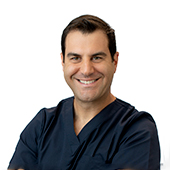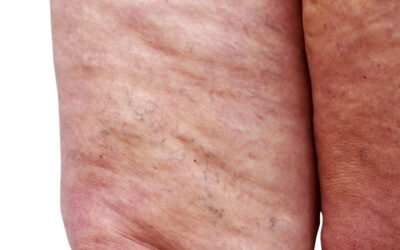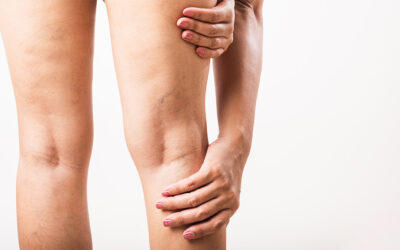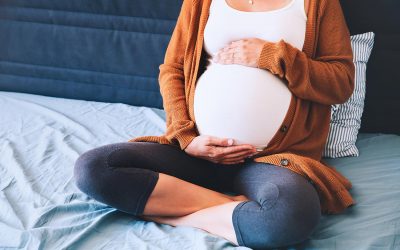Varicose veins that appear during pregnancy can cause discomfort, throbbing pain, cramps, swelling, and can be a source of extra concern to expectant mums. Let’s look at what they are, what causes them, and what you can do about them.
What are varicose veins?
Varicose veins are twisted, blueish-purple, protruding leg veins that bulge under the skin.
The role of the veins is to return deoxygenated blood to the heart. In healthy veins, one-way valves run along their interior walls, allowing blood to flow in only one direction. Varicose veins develop when the valves fail, allowing blood to leak backward through the defective valve, this is called venous insufficiency. The blood collects in this faulty section of the blood vessel, causing it to enlarge and bulge on the surface of the skin.
What are the symptoms of varicose veins?
- Heaviness and throbbing
- Pain and aching in the legs.
- Itching and eczema on the lower leg
- Swollen feet and ankles
- Muscle cramps at night
- Restless legs or a feeling of “creepy crawlies” in the legs
Why do people get varicose veins during pregnancy?
Pregnancy and associated hormonal changes can both aggravate pre-existing varicose veins and cause new ones to develop.
A growing baby, the placenta, and the uterus can put incredible pressure on the veins in the pelvis. This venous insufficiency may be noticeable in the vulvar area, or it may create the ripple effect of visible painful veins further down in the legs.
Phlebologists (vein doctor) or vascular sonographers will perform an ultrasound on leg veins to identify the origin of the veins so the root cause can be treated. A vein problem in the legs can often be traced back to vulvar or pelvic veins, even if the patient has not observed symptoms in the groin area.
Can varicose veins be prevented?
Unfortunately, little can be done to prevent varicose veins if you are genetically predisposed. However, there are some measures that can be taken that may slow their progression or relieve the symptoms. Please consult your family doctor before doing any of the following while pregnant.
- Wear medical or graduated compression stockings during the day. This helps to compress and support the vein wall thereby speeding up blood flow and reversing venous hypertension. It also supports the calf-muscle pump, improves lymphatic drainage, and prevents swelling.
- Avoid sitting or standing for long periods. Try to move around at least once every hour or so.
- Maintain a healthy lifestyle.
- Elevate the legs above the heart to use gravity to assist with blood flow. This can help relieve swelling and pain
Are pregnancy-related varicose veins serious?
Varicose veins rarely cause serious health problems during pregnancy. However, varicose veins can trigger deep vein thrombosis (DVT): a blood clot in the deep veins of the legs or superficial vein thrombosis (SVT): a blood clot in surface veins or the varicose veins themselves.
DVT during pregnancy is probably the most serious of the complications. Although this is uncommon, it is considered one of the leading causes of thrombosis in women and has the potential to be life-threatening should the clots travel to the lungs.
Varicose veins can be a progressive condition and may worsen with time, even after pregnancy. Patients with severe varicose veins (or chronic venous insufficiency) may experience worsening symptoms such as discolouration of the skin (hyperpigmentation), thickening of the skin of the lower leg or ankle (lipodermatosclerosis), and breakdown of the skin barrier which become venous ulcers. Learn more about chronic venous disease here.
Will the problem veins go away on their own?
After pregnancy, some of the pressure on the veins is eased, this may make it appear that the veins have gone or are healing. However, once the valves inside the blood vessels are damaged, they do not repair themselves. Medical treatment is necessary.
How to treat pregnancy-related varicose veins?
Varicose veins should be treated between or after pregnancy. They should not be treated during pregnancy. There is a range of non-invasive treatments available including endovenous laser ablation (EVLA), ultrasound guided sclerotherapy, VenaSeal medical adhesive, and radiofrequency ablation.
Having treatment before or in between pregnancies avoids potentially serious issues during pregnancies, in particular, deep or superficial blood clots that can migrate to the lungs, and symptoms such as swelling, aching, pain, and venous eczema.
Key Takeaways
- Varicose veins are winding, blue, or purple bulging veins on the skin surface, or below the surface, that are incompetent at returning blood to the heart.
- Symptoms include pain, throbbing, swelling, itching, eczema, and restless legs.
- New problem veins can develop during pregnancy due to the pressure a growing baby places on the body, plus the fluctuation of pregnancy
- If you’re genetically susceptible to venous disease, it is not preventable.
- Varicose veins rarely cause serious health problems during pregnancy. However, there is a slight risk of DVT or SVT.
- Treatments include endovenous laser ablation (EVLA), ultrasound guided sclerotherapy, VenaSeal (medical adhesive), and radiofrequency ablation.






